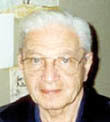Shalom Luria (Kalmanovich)
Researcher, Translator, Editor and Teacher 1920-2011.
 Born in Kiev, Ukraine. In 1921, his family fled to independent Lithuania and settled in the city of Panevėžys. When he was eight, the family moved to Vilna and settled there. He first met Abba Kovner, and later edited his writings when visiting the Hashomer Hatzair cell in Vilna. After graduating, he decided to make Aliyah to Eretz Israel to avoid service in the Lithuanian army, among other things. He made Aliyah to Eretz Israel on his own in 1938, and joined the Hashomer Hatzair cell in Haifa, and in 1940 with his friends, joined Kibbutz Merhavia, of which he is still a member.
Born in Kiev, Ukraine. In 1921, his family fled to independent Lithuania and settled in the city of Panevėžys. When he was eight, the family moved to Vilna and settled there. He first met Abba Kovner, and later edited his writings when visiting the Hashomer Hatzair cell in Vilna. After graduating, he decided to make Aliyah to Eretz Israel to avoid service in the Lithuanian army, among other things. He made Aliyah to Eretz Israel on his own in 1938, and joined the Hashomer Hatzair cell in Haifa, and in 1940 with his friends, joined Kibbutz Merhavia, of which he is still a member.
His father, Zelig Hirsch Kalmanovich, was a Yiddish journalist and Hebrew teacher, and later one of the most prominent figures in Vilna Ghetto. The secret diary he wrote serves as a faithful source that describes the experiences of the ghetto and the extermination of the Jews of Vilna ("Diary of the Vilna Ghetto and Writings from the Literary Estate Found in the Ruins," 1977). He was murdered in a camp in Estonia in 1944. Luria named his family after his mother's Hebrew family name, after obtaining his father's advice when he visited Israel on the eve of the Holocaust, as an expression of his desire to integrate into the country.
At Kibbutz Merhavia, Luria spent many years in teaching and educating. During the War of Independence, he served in the Golani Brigade, then studied teacher education at the "Kibbutzim College", and Hebrew Literature and Biblical Studies at the University of Haifa. At Tel Aviv University, he completed his Master's Degree in Hebrew literature, and wrote his doctoral dissertation under the supervision of professor Shmuel Verses. The subject of his thesis was: "Figurative Language in the Bilingual Works of Mendele Mokher Sefarim," (1977).
His life's work is the study of Yiddish literature and culture in Hebrew. He was the initiator, founder and editor of the journal "Pages for Research in Literature," University of Haifa. In 1993, he co-founded with others the journal Chulyot, dedicated to the study of Yiddish literature and culture in Hebrew. Ten volumes of the journal have been published to date, and constitute the central platform for the study of Yiddish in the entire Jewish world. He translated some important works from Yiddish, and to some added an introduction or an epilogue and some he even illustrated, among them: "The Ghetto Fighter: The Young Bund in the Warsaw Ghetto" from Mendele Mokher Sefarim, (2001); " Ketavim be-ibam," Mendele Mokher Sefarim (1994); "On the Rivers of Babylon," a biblical play by Yitzhak Katzenelson (1995); "In Love and Pain: Some Memoirs on David Hofstein" (1998); "The Small Man," Mendele Mokher Sefarim (2003), "The Hidden" (2004); "Treasure of Hidden Stories," by The Hidden (2006).
His own field of literary enterprise was the study and editing of Abba Kovner's writings. In 1981 he edited Kovner's book of essays "On the Narrow Bridge." In 1988, he edited the Anthology: "Abba Kovner: Mivḥar ma’amre bikoret ‘al yetsirato (Trans.: A Selection of Critical Reviews of his Writings) (Tel Aviv, 1988). The "Scrolls of Testimony" was published in 1993. Apart from these, Luria published hundreds of research articles in literature, in Yiddish and Hebrew, some of which have not been collected and published in book form.

